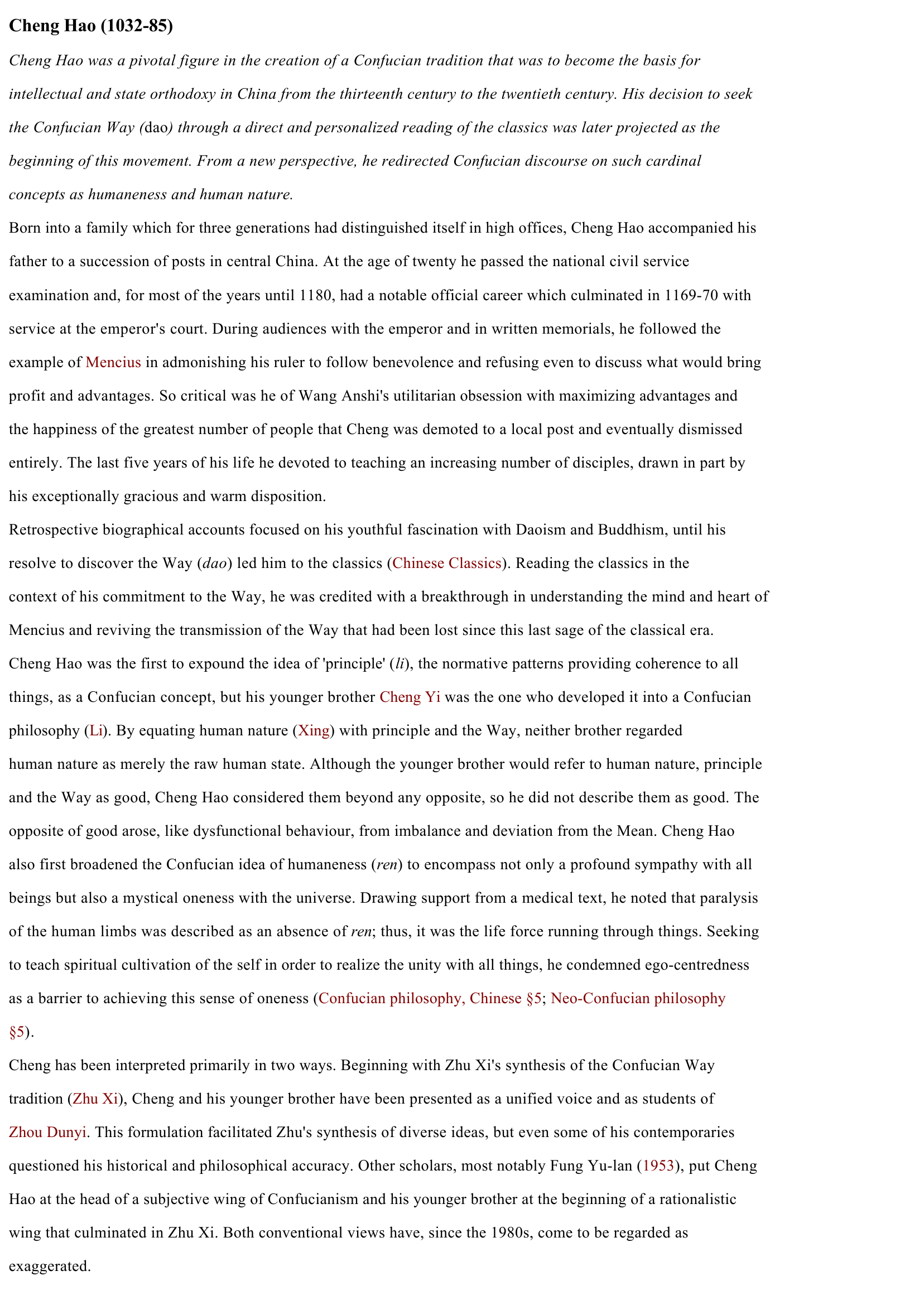Cheng Hao
Publié le 16/05/2020

Extrait du document
«
Cheng Hao (1032-85)
Cheng Hao was a pivotal figure in the creation of a Confucian tradition that was to become the basis for
intellectual and state orthodoxy in China from the thirteenth century to the twentieth century.
His decision to seek
the Confucian Way ( dao) through a direct and personalized reading of the classics was later projected as the
beginning of this movement.
From a new perspective, he redirected Confucian discourse on such cardinal
concepts as humaneness and human nature.
Born into a family which for three generations had distinguished itself in high offices, Cheng Hao accompanied his
father to a succession of posts in central China.
At the age of twenty he passed the national civil service
examination and, for most of the years until 1180, had a notable official career which culminated in 1169-70 with
service at the emperor's court.
During audiences with the emperor and in written memorials, he followed the
example of Mencius in admonishing his ruler to follow benevolence and refusing even to discuss what would bring
profit and advantages.
So critical was he of Wang Anshi's utilitarian obsession with maximizing advantages and
the happiness of the greatest number of people that Cheng was demoted to a local post and eventually dismissed
entirely.
The last five years of his life he devoted to teaching an increasing number of disciples, drawn in part by
his exceptionally gracious and warm disposition.
Retrospective biographical accounts focused on his youthful fascination with Daoism and Buddhism, until his
resolve to discover the Way ( dao ) led him to the classics ( Chinese Classics ).
Reading the classics in the
context of his commitment to the Way, he was credited with a breakthrough in understanding the mind and heart of
Mencius and reviving the transmission of the Way that had been lost since this last sage of the classical era.
Cheng Hao was the first to expound the idea of 'principle' (li), the normative patterns providing coherence to all
things, as a Confucian concept, but his younger brother Cheng Yi was the one who developed it into a Confucian
philosophy ( Li).
By equating human nature ( Xing ) with principle and the Way, neither brother regarded
human nature as merely the raw human state.
Although the younger brother would refer to human nature, principle
and the Way as good, Cheng Hao considered them beyond any opposite, so he did not describe them as good.
The
opposite of good arose, like dysfunctional behaviour, from imbalance and deviation from the Mean.
Cheng Hao
also first broadened the Confucian idea of humaneness ( ren) to encompass not only a profound sympathy with all
beings but also a mystical oneness with the universe.
Drawing support from a medical text, he noted that paralysis
of the human limbs was described as an absence of ren; thus, it was the life force running through things.
Seeking
to teach spiritual cultivation of the self in order to realize the unity with all things, he condemned ego-centredness
as a barrier to achieving this sense of oneness ( Confucian philosophy, Chinese §5 ; Neo-Confucian philosophy
§5).
Cheng has been interpreted primarily in two ways.
Beginning with Zhu Xi's synthesis of the Confucian Way
tradition ( Zhu Xi ), Cheng and his younger brother have been presented as a unified voice and as students of
Zhou Dunyi .
This formulation facilitated Zhu's synthesis of diverse ideas, but even some of his contemporaries
questioned his historical and philosophical accuracy.
Other scholars, most notably Fung Yu-lan ( 1953 ), put Cheng
Hao at the head of a subjective wing of Confucianism and his younger brother at the beginning of a rationalistic
wing that culminated in Zhu Xi.
Both conventional views have, since the 1980s, come to be regarded as
exaggerated..
»
↓↓↓ APERÇU DU DOCUMENT ↓↓↓


